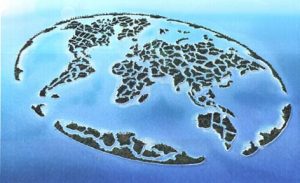“The Worldâ€, an archipelago of artificial islands reclaimed a few kilometres off the Duba’s coastline is almost forgotten.
Nakheel, the developer behind it, which is being restructured alongside the $25bn restructuring of debts at its parent Dubai World, states that the project could be revived from its dormant state in a few years’ time.
The optimistic prognosis for a development that epitomised Dubai’s boom-time ambition flies in the face of the evidence on the ground. Or should that be evidence on the reclaimed sand?
 Two developments are going ahead – one on the island of ‘Europe’ and the other on ‘Lebanon’ – but there has been minimal activity and the former development is facing delays in securing building permits.
Two developments are going ahead – one on the island of ‘Europe’ and the other on ‘Lebanon’ – but there has been minimal activity and the former development is facing delays in securing building permits.
Other buyers of islands on the World archipelago, who have no intention of developing without related utilities infrastructure, are trying to exit their investments by transferring their down-payments onto land-based Nakheel projects. Attempts by the government-owned developer to squeeze extra cash out of these deals were rejected by the court in December.
The owners of the UK islands, meanwhile, have found themselves jailed in Dubai for bouncing cheques, a criminal offence in the UAE. Claiming innocence, their families have mounted a campaign for their release.
Nonetheless, the latest hearings at the Dubai World Tribunal ended up with a victory for The World, represented by Graham Lovett, managing partner for Clifford Chance in the Middle East.
Penguin Marine Services, the logistics provider on The World, had attempted to stop The World from cashing a performance bond – which protects against shoddy work from a contractor – and an advance payment guarantee worth Dh6.86m. The tribunal rejected this application and will provide its reasoning later. Penguin, represented by Dubai-based Hadef, argued that an absence of activity on the islands over the past few years had made it impossible to earn enough revenue to pay Nakheel license fees and rent on its port operations.
Significant erosion from the islands had led to a silting of navigation channels between the islands, which are falling back in the sea. A Nakheel spokesman in a statement denied that the islands are sinking: “The World Islands are not slipping away, and our periodical monitoring survey over the past three years didn’t observe any substantial erosion that requires sand nourishment.â€
Penguin had entered into negotiations with the former management of Nakheel to restructure the agreement which it says had become “unworkable.†But the new management installed at Nakheel since March 2010 has led to a more “aggressive†approach, leading to the “unwarranted demand†for Dh14.8m in outstanding license fees. Penguin argues that it has lost Dh25m by setting up the container logistics port while earning minimal revenue.
Now, with Nakheel sanctioned by the tribunal to cash the bonds, the Singaporean company faces the hard choice of either quitting or throwing more money at a project which, if not dead, is certainly in a deep sleep.
Nakheel’s lawyer argued that these payments will “keep it in the game,†potentially providing it with some upside as and when development activity revives on the islands, once envisioned as a Bali-esque paradise of water homes and hotels.
It is a tough choice for Penguin to make, given the parlous state of the onshore real estate sector in Dubai, where valuations have halved and new supply continues to keep downward pressure on the market. The prospects for The World’s sandy outcrop of islands appear even bleaker.
Penguin’s actions will become another test of how much faith foreign investors have in their future ability to make money in the high-risk world of Dubai real estate.
Nakheel might have won this particular legal battle, but it could turn into a victory that is offset by staggering losses, if its actions unsettle foreign sentiment further.




































